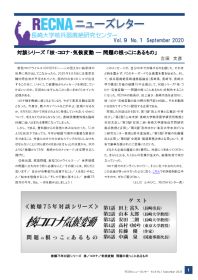It is published simultaneously by RECNA-Nagasaki University, Asia Pacific Leadership Network for Nuclear Non-proliferation and Disarmament (APLN), and Nautilus Institute and is published under a 4.0 International Creative Commons License the terms of which are found here.
Pandemics
C G Nicholas Mascie-Taylor and K Moji
A Working Paper presented to
The 75th Anniversary Nagasaki Nuclear-Pandemic Nexus Scenario Project
About the Author
Nick Mascie-Taylor is Professor of Human Population Biology and Health and Director of Research in Global Health at the University of Cambridge, UK and a Fellow of Churchill College, Cambridge. He has served as President or Vice-President of the European Anthropological Association for nearly 20 years and is an Overseas Fellow of the Hungarian National Academy of Science. Nick has been running, monitoring and evaluating nutrition and health related surveys both from a research perspective and to formulate government policy in South Asia and Africa for over 40 years. He has considerable experience in analysing data and has been running basic and advanced data handling training programmes for Department for International Development (DFID), The British Council, Danish International Development Agency (DANIDA) and The World Bank in 16 countries. Nick has worked in Bangladesh for over 30 years most recently on developing a cohort to study non-communicable disease. With the onset of covid-19 the cohort (n=75,000) has been repositioned to collect longitudinal data via telephone calls on covid-19 symptoms and the social and economic impacts.
Kazuhiko Moji is Professor of Human Ecology and the Dean of Nagasaki University School of Global Humanities and Social Sciences, and the Director of Department of Global Health at Graduate School of Tropical Medicine and Global Health. He had been the project leader of the Ecohealth Project “Environmental Change and Infectious Disease in Tropical Asia” between 2008 and 2013 at the Research Institute for Humanity and Nature (RIHN), Kyoto, Japan. He received his MA (1978) and Ph.D. (1987) in Health Sciences at the University of Tokyo. He was the President of the Japanese Society of Tropical Medicine between 2011 and 2014.
Abstract
A pandemic is defined as an epidemic occurring worldwide, or over a very wide area, crossing international boundaries and usually affecting a large number of people. Pandemics have occurred throughout human history and appear to be increasing because of rising emergence of viral diseases from animals (zoonoses). The risk of a pandemic arises from the combined effects of the Spark Risk (e.g. bushmeat hunting) and the Spread Risk (e.g. mode of transmission and population susceptibility). Pandemics have health, economic, gender, social and political impacts. Building pandemic preparedness is complex and requires considerable coordination. In the context of covid-19 modelling of transmission has been central to many government’s response including introduction of lockdown and physical distancing. Developing vaccines for novel pathogens is not simple or straightforward and community mitigation measures are essential. There are a number of lessons which have been learnt from the covid-19 pandemic including acting quickly, extensive testing, digital surveillance, public trust in government and leaders and cooperation between nations.
Keywords
Pandemic, zoonoses, pandemic consequences, community mitigation, vaccine development, lessons learnt from covid-19
Full text (PDF) is here.

















